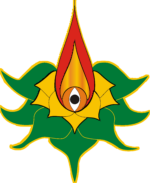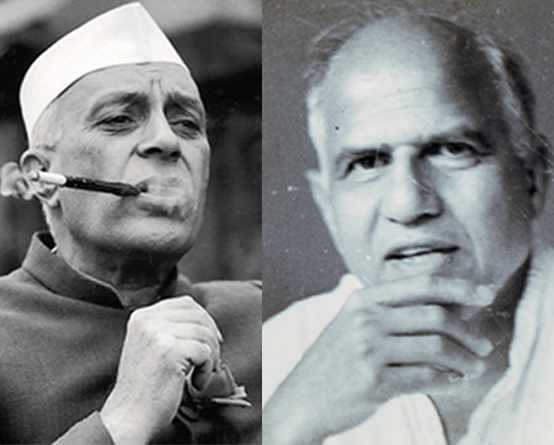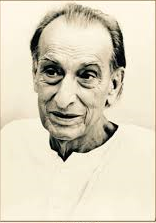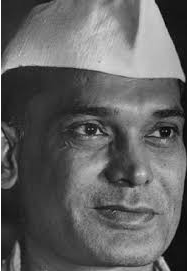It was in November 1962 that Gandhian freedom fighter and eminent historian, Shri Dharampal, then aged forty, with great audacity drew public attention to the follies of India’s China policy by appealing in an open letter to all Members of Parliament, to consider forcing Shri Jawaharlal Nehru, the then Prime Minister, to resign and own up to the numerous failures of his Government, including his omissions & commissions since 1947, which culminated in the debacles suffered along the Indo-China border during the preceding months.
This open letter (whose text is reproduced below) was formulated by Shri Dharampal and since its contents were supported by two close friends, Shri Roop Narayan and Shri Narendra Datta, it was signed by all three and released to press on 22nd November 1962 [their short profiles are given below]
Dear Friend,
In a circular recently sent to all Congress M.P.s, M.L.A.s, M.L.C. s and Pradesh and District Congress Committees, the All-India Congress Committee has said: "Positive stand against criticism of the Prime Minister should be taken. It must be emphasised that those who criticise him are traitors."
In a broadcast over the All-India Radio announcing the fall of Bomdilla, the Prime Minister said:
"We are not going to tolerate this kind of invasion of India by any foreign country. […]We must train ourselves and we must steel ourselves to meet all these reverses and to make our determination still firmer and to do all we can to repel and throw out the invader from India. We shall not be content till the invader goes out of India or is pushed out. We shall not accept any terms that he may offer because he may think that we are a little frightened by some little set-backs. […]Any set-back which may come to us in this way, which has been thrust upon us, will not permit us to waver in our determination." He ended with: "I want to make a pledge to them here and now that we shall see this matter to the end and the end will have to be a victory for India."
Alas! these are words and sentiments which the country has been hearing for the past 15 years. The context only changes. One day it may be grow-more-food; another, the building of modern temples symbolised by steel plants and dams; yet another time, national integration or our quarrel with Pakistan or the endless fight against old prejudices and a hundred other things. The fact is that all content has been drained out from such exhortations and instead of leading to courage, to determination, to hope, each pronouncement of the Prime Minister leaves the people limp.
Perhaps the Prime Minister has changed, has seen the light. But how is one to be convinced. The actions of the Government of India during the last 30 days are no pointers. It is not to ignore the steps Government has taken since October 20. These, in fact, can be enumerated. The Prime Minister did demote the Defence Minister and then sacked him; but soon after he publicly regretted this step. A National Defence Council and a National Citizens' Committee have been formed. The 30 odd members of the first have yet to meet. About the second, the less said the better. Maybe, with God's grace, the Prime Minister and his daughter, who respectively chair these two august bodies and the Prime Minister's court can save this country and its freedom. Dare one hope ?. The past gives no assurance.
Perhaps this time, the Prime Minister is his old 1929 self again. But how does one know?
Nobody can expect an old man of 73 to stand shoulder to shoulder with men of the Indian Army at Bomdilla (which is no more) or Chushul or some other border posts. But surely, if he feels as he claims, if his pledge has any meaning, if his patriotism has any passion, the Prime Minister can still move over to Tejpur or Gauhati or Shillong or some other place, offer comfort and confidence to the people of Assam, supervise the generals appointed by him and be available on the spot till, as he says, we get rid of the Chinese from Indian soil. But does he have courage? Does he believe in his own words? Does he have hope?
In reply to the Government of India, on, November 18, 1950, the Chinese had said: "The Chinese People‘s Liberation Army will liberate the Tibetan people and defend the frontiers of China. This is the firm policy of the Chinese Government."
Which were those borders which China had referred? Did the Government of India enquire? Did the Prime Minister think? It brings popularity to call the Chinese "this treacherous enemy, but had not one had sufficient notice ? 12 long years is not such a short time.
Time is running fast in this country. Not that if the Chinese occupy a large part of the country, they can not be thrown out in due time; not that truth ultimately does not Win. But is this the fate of this country to first allow the aggressors to come in and then exerting for an endless time in pushing them out? Firstly it is for the Prime Minister, personally, to make his own choice. Can he physically be with the people who are defending India at our borders and the citizens of Assam who need assurance? Has he the nerve?
Can he work as a member of a team; can he rise above personal glory? Above all, is he really sorry for all the mess which is there today? In olden times, one in his position would have crawled hundreds and thousands of miles to beg forgiveness of one’s fellow beings and of the gods that may be. He at least can tender an unqualified public apology. The people of this country would not deny forgiveness to an old man if he were really repentant.
It is no crime that in this crisis in India, he is not equal to the task. He has done his part in days gone by. But today is no occasion to look to the past. The need is he gets out so that the Chinese do not come any further and are pushed back in a reasonable time, more so that the fight which is going on serves some purpose.. One wants to be certain that we are fighting this battle with firmness according to some plan.
Today the Chinese have come with the ceasefire. This may rightly be a ruse. But if and when the time for negotiations or a settlement comes, one must have people who can do the job and who can be also trusted by the people. The Prime Minister's past record is of a man engaged in a private deal. If the Prime Minister can not decide, it is for the Congress Party or the Parliament of this country, or falling both for the head of the Indian Republic to make the choice for the Prime Minister that he retires, and give India a Government which knows what it is doing which does not talk in terms of eventual Triumph but does something today.
The people of this country have been shamed, they have been bewildered by the ways of Government. How long can they wait? It is for wise people in this country, whoever they are to see that this shame and anger does not burst its bounds, does not lead to a road which no one desires. Let those be put in – charge who can act against the aggressors and not against their own people.
The people who criticise the Prime Minister are no less patriotic than him. If anything their patriotism is more robust.
Yours sincerely,
Signed by Dharampal, Roop Narain, NN Dutta, Member Parliament, New Delhi.
 Narendranath Dutta, Narendranath Dutta,co-signatory to the open letter with Shri Dharampal |
This hard-hitting epistle created a furore in the media, with reactions ranging from hostile criticism and condemnation to calling for stringent action to be taken against such ‘upstarts’. A resolution was even passed by the Congress Working Committee to treat any such criticism, lodged against the Prime Minister during this period of national crisis, as treason for which appropriate action should be taken.
The All India Congress Committee, headed by its President Neelam Sanjiva Reddy, in a circular sent to all its MPs, MLAs, MLCs, Pradesh and District Congress Committees, stated:
“Positive stand against criticism of the Prime Minister must be taken. It must be emphasised that those who criticise him are traitors.”
The Farce of Nehruvian Tolerance: The Government then adopted a draconian measure by arresting Dharampalji along with his two friends, after slapping sedition charges against them for their ‘anti-national’ activity and imprisoned the three ‘culprits’ suo moto in Tihar Jail. The related official proceedings, including the jail records, need to be researched further in order to fully evaluate the unconstitutional nature and illegality of this governmental action.
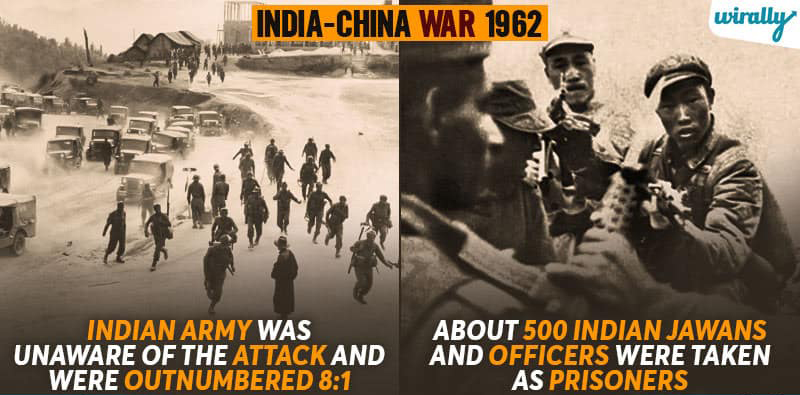 Important members of the ruling elite of the time, deviously equated this forthright critique of Nehru’s blunders by three former freedom fighters, manifesting Gandhi-inspired patriotism, with sedition charges imposed on some Communist leaders for their outrageous support to Maoist China against India. Thereby an attempt was made to exonerate the Government’s knee-jerk reaction in incarcerating patriotic Gandhian freedom fighters with impeccable credentials. In the National Herald dated December 22, 1962, Shri Banarsi Das (UP Minister of Information & Broadcasting), in a column titled, “Patriotism is not enough” elaborates on the matter as follows:
Important members of the ruling elite of the time, deviously equated this forthright critique of Nehru’s blunders by three former freedom fighters, manifesting Gandhi-inspired patriotism, with sedition charges imposed on some Communist leaders for their outrageous support to Maoist China against India. Thereby an attempt was made to exonerate the Government’s knee-jerk reaction in incarcerating patriotic Gandhian freedom fighters with impeccable credentials. In the National Herald dated December 22, 1962, Shri Banarsi Das (UP Minister of Information & Broadcasting), in a column titled, “Patriotism is not enough” elaborates on the matter as follows:
“There is no sense in proclaiming emergency if everyone is allowed to say or do whatever he likes, even if it is said and done from patriotic motives. It is possible that policy may be distorted in practical action; so each case of civil liberties has to be discussed as a separate case, even when principles and policies are laid down as far as possible. It is too much to ask of the Government that they must fight and win wars while allowing critics to indulge not only in criticism but in incitement of the people against the Government.[…]; it may thus become necessary in the interests of national defence to take action against some persons, whether they are Communists or Constructive Workers, detentions were made not because they belonged to a party but because they were not committed to fight aggression and were indulging in prejudicial activities. Nobody bothered to raise the general issue of civil liberties in their case in any serious form, while the detention of three persons in Delhi, who are described as constructive workers, has led to a hullabaloo […] one broad difference between the two sets of detention may be noted. Communists were arrested on allegations of being friendly to the Chinese; the Delhi arrests were made on allegations of inciting the people against the Government […].”
In response, a reader, Shri Brahma Prakash Sharma from Muzzafarnagar, in a letter, published in The National Herald dated 7th January 1963, entitled “Prime Minister’s Critics”, questioned the advocacy of hero worship or the personality cult by Shri Banarsi Das, during the period of emergency:
Take Tibet, as an instance. Who can deny that the Government’s blunder on its Tibet Policy has been truly Himalayan in its consequences? […] You may jeer as much as you like at the ‘Seers’ (Mr. Das’s own word) who stay unreconciled to the decisions taken almost at personal levels even on questions of the highest moment like this one. […] In this connection, Mr. Krishna Menon’s recent shifting of the responsibility for our political and diplomatic difficulties in Tibet to our British rulers is truly amusing, and no less amazing. […] The Krishna Menon episode cannot have been easily forgotten so soon. Were it not for the persistent and unrelenting demand for his removal, there is no doubt that there would have been no change in the Defence Ministry. […] Does Mr. Das want to imply that all criticism against Mr. Krishna Menon and the Prime Minister for unquestioning support for Mr. Menon should have been postponed till after the war with China was over? […] It is sad to have to say that the defence question is being treated as a party affair. One has to only look at the composition of the various committees being constituted at all levels to be convinced of the truth of this charge. Representation of people outside the charmed circle is grudging, if any at all. For instance, here in Muzaffarnagar, we have a Zilla Suraksha Samiti, made up of over a hundred members. […] All prominent members of the Congress in the District are its members in one garb or another. And there is no one from amongst other parties, except where one or two could not be avoided because of their position or otherwise. […] Notwithstanding denial at the state level, the emergency is being treated, side by side no doubt for the purpose for which it has been declared, namely, national mobilisation, also for the purpose of rehabilitating the ruling party itself, the reputation of which has suffered a very serious jolt because of the acts of omission preceding and immediately following the Chinese invasion. […].
|
|
Real Democrats- JP Narayan & Acharya Kriplani- Condemn Nehru: More significantly, notable support came from Shri Jayaprakash Narayan and Shri J. B. Kripalani who presided at public meetings organized to campaign for the immediate release of the three unjustly imprisoned ‘patriots’. Acharya J. B. Kripalani, coming to their defence, also published an article in The National Herald on 27th December 1962 entitled “Criticism of the Critics”. To quote his own words:
“You rightly say that ‘patriotism is not enough’. This should be addressed more to the holders of Power, who have brought ‘sorrow, shame and humiliation’ to the country and those who have been ‘credulous and negligent’ than to their critics, who often warned them and have been justified by events and results.”
Thanks to the adamant stand taken by these three upright freedom fighters in opposition to the neo-colonial hegemony exercised by the Nehruvian elite, this concrete evidence of blatantly undeserved incarceration received prominent publicity. Their efforts succeeded eventually in securing the release of these three post-Independence Satyagrahis after nearly three months, with positive intervention from Shri Lal Bahadur Shastri, the then Union Home Minister after a meeting with families & friends of the imprisoned. Shri Othie Saivu, who spent many years working with Dharampal ji, recalls in his Memoirs written in Tamil in 2018, his interaction with Dharampalji in Sewagram Ashram in 2003. During this interaction, Dharampal ji shared the experience of the 1962 imprisonment.
Nehru’s Nepotism & Disdain for Institutions: Shri Othie Saivu writes: “Dharampal, though he laughed off the whole affair (when I talked to him about this circa 2003, in Sewagram, Maharashtra) made a couple of points clear[7] :
- That, but for Lal Bahadur Shastri and Jayaprakash ‘JP’ Narayan’s efforts – they would have continued to languish in Tihar jail.
- That, though JP tried to take the cases of this Trio and many others directly to Nehru, the latter was not willing to listen ( and release the unjustly jailed people) because at one level – Nehru assumed that anyone who opposes him is a Traitor, because he was thinking he was doing everything for the cause of India and Socialism and that he genuinely thought he never allowed extra-constitutional matters to interfere with his discharge of responsibilities as a PM!
- That even though the immediate context for the Letter (dated November 21, 1962 as quoted above) was the China Debacle, they were also worried about the emergence of a personality cult around Nehru and curbing of Freedom Expression.
The absence of any meetings of National Defence Committee where he was the Chair was a glaring example of lack of consultation and coordination in policy formulation during this critical period. Worse still, he anointed his daughter Indira as Chairman of the National Citizens Committee ignoring many worthy stalwarts. Typically, this Committee was not even convened once to take stock of during this tumultuous period, form part of deep malaise in his style of Governance.
Dharampal et al point out that though Nehru (and India) did have enough notice about the Chinese intentions, we failed to see that – and got generally lost in the rhetoric. Isn’t it the duty of the leader and head of State to be aware of all these developments? Complete Tamasic (projected & misconstrued falsely as committed to ahimsa or non- interference ) attitude on part of a Head of State turned out to be a disaster and Nehru was lost in his own dreams and rhetoric of Panchsheel and socialist utopia, while completely oblivious to the ground realities as he came to depend upon courtiers..
He also became involved in civil liberties struggles as the Central and State Governments arrested thousands of critics, detaining many of them without trial, settling all manner of old and petty personal/political scores. [8]
Sequel: China held on to the territory it occupied during the 1962 war, even consolidated it through its Belt & Road Initiative. In doing so, it took substantial control over the POK regions including Gilgit Baltistan for its ambitious CPEC (China-Pakistan Economic Corridor) Project and is currently engaged in tense border conflict to gain a strategic advantage over the Finger 4 and Manasa Sarovar areas of the Ladakh region in the Western Sector of our over 4000 km border with China. Fortunately, Indian Defence Forces led by General Sagat Singh ( please see Randhir Singh’s A Talent for War: The Military Biography of Lt. Gen Sagat Singh) , could push back the PLA advances in the Nathu La & Cho La areas of central sector during 1967 war defending the crucial Chicken Neck & Siliguri Sector. This paved the way for India to fully integrate Sikkim in 1975 and also respond effectively to expansionist Chinese advances in 1986 under Gen Sundarji. (Please see the recent book by the Former Army Captain Probal Das Gupta on the Indo China War in 1967). The crucial blunders of flawed policies under Nehru’s regime through the 1950s, however, continue to bleed us on the crucial western side of Indo Tibetan regions which suffered neglect of our political leadership of the times because displayed Nehru’s gross ignorance and indifference regarding this region’s strategic significance – so prophetically called out by Dharampalji and his friends in the letter of November 1962.
The issues raised by Dharampal ji continue to remain of crucial importance even today because India continues to pay a heavy price for Nehruvian misadventures, his flimsy romance with Communism and his imperious intolerance of even well-meaning criticism or advise. The marginalization of patriotic freedom fighters under Nehruvian Congress combined with authoritarianism has had a debilitating effect on our national life. Add to it the personality cult & dynastic obsession with keeping power within the Family has not only destroyed the Congress party but also made it easy hostage to anti-India forces.
A brief profile of Shri Dharampal (and his two friends) is given below for those not familiar with their lives: Through years of painstaking effort during the 60s & 70s Dharampalji ( born Phalguna Bahula Ashtami 1922 CE Kandla, near Meerut – Karhteeka Sukla Tritheeya 2006 CE, Sewagram, Wardha ) busted many mainstream conceptions to uncover a whole range of misconceptions regarding pre-British Indian Society by documenting the foundational principles of its indigenous social organisation. He passed away in …and is survived by his son & two daughters while his wife died much earlier.
He authored several seminal books—the entire list of his publications is given below. Dharampal was inspired by Mahatma Gandhi throughout his life. He received his first glimpse of Gandhiji at the age of seven when he accompanied his father to attend the 1929 Lahore Congress. In March 1931, when Sardar Bhagat Singh and his colleagues were sentenced to death and executed by the British colonial authorities, Dharampal recalls that many of his friends took to the streets of Lahore, shouting slogans in protest. Yet remaining critical of this rebellious assertion, and despite the influence of his semi-westernized education at school and college, he was drawn towards the movement led by Mahatma Gandhi: soon he started wearing khadi, a practice he followed all his life.
Mahatma Gandhi’s call for individual Satyagraha in October 1940 marked the beginning of his involvement in national politics and the subsequent abandonment of his B.Sc. in Physics. In August 1942, he was present as a fervent spectator at the Quit India session of the Congress in Bombay, whereupon he joined the movement and was active as an underground member of the AICC group run by Sucheta Kriplani until his arrest in April 1943. After 2 months in police detention, he was released but debarred from Delhi. A year later in August 1944, being interested in village community work, he was introduced to Mirabehn (the British born disciple of Mahatma Gandhi) and joined her soon after at the Kisan Ashram, situated midway between Roorkee and Haridwar.
Narendra Nath Datta: (14th December 1926 – 17th June 2017) was born and brought up in the former Northwest Frontier Province (now Khyber Pakhtunkhwa, Pakistan). As a teenager, he participated in the Freedom Struggle, and was known for his rousing speeches. After Partition he was in charge of the refugee settlement near Faridabad. Later in the 1950s, he joined the cooperative movement, and together with Lakshmi Join established the Cottage Industries Emporium, of which he was one of the Directors.
Roop Narain: (ca. 1923- January 2007) originated from Haryana and was active during the Freedom Movement. After Independence, he served as a committed Congress worker in the Chandni Chowk district of Old Delhi.
His significant publications which brought the
Must-Read books by Shri Dharampal based on pioneering research that provides insightful accounts of indigenous wisdom and knowledge traditions of Indian society:
- Bharatiya Chitta, Manas and Kala, Centre for Policy Studies, Madras, 1993
- Bharatiya Chitta, Manas va Kala (Hindi): Centre for Policy Studies, Madras, 1993
- The British Origin of Cow-Slaughter in India (2002), Society for Integrated Development of Himalayas, 2002
- Understanding Gandhi, Other India Press, 2002
- Panchayat Raj as the Basis of Indian Polity: Other India Press, 1962
- Indian Science and Technology in the Eighteenth Century: Some Contemporary European Accounts, Other India Press, 2000
- Civil Disobedience and Indian Tradition: with Some Early Nineteenth Century Documents, Sarva Seva Sangh Prakashan; 1971
- The Madras Panchayat System, Vol II: A General Assessment, Impex India, Delhi 1972
- The Beautiful Tree: Indigenous Indian Education in the Eighteenth Century, Biblia Impex, 1983
- Some Aspects of Early Indian Society and Polity and their Relevance to the Present, Indian Association for Cultural Freedom
- Bharat ka Svadharma (Hindi), Vagdevi Prakashan Bikaner, 1994
- Despoliation and Defaming of India: The Early Nineteenth Century British Crusade, Bharat Peetham, 1999
- With T.M.Mukundan, The British Origin of Cow-Slaughter in India: with some British Documents on the Anti-Kine-Killing movement 1880-1894, Society for Integrated Development of Himalayas, Mussoorie 2002
- Understanding Gandhi, Other India Press, 2005
- Rediscovering India: Collection of Essays and Speeches (1956–1998), Society for Integrated Development of Himalayas, Mussoorie 2003
References used in the article above:
- Letter to All Members of Parliament dated 22nd November 1962
- Response from Shri Banarsi Das, the then UP Minister of Information & Broadcasting
- Response from Shri Brhama Prakash Sharma, Muzaffarnagar
- Response from Acharya J B Kripalani on 27th Dec 1962
- Singh, Randhir. A Talent for War: The Military Biography of Lt Gen Sagat Singh, VIJ Books (India) Pty Ltd, 2013
- DasGupta, Probal. Watershed 1967: India’s Forgotten Victory over China, Juggernaut, 2020
- Ottie Sevu. “Memories & Notes.” Tweet response to Alok Bhat & Ramachandra Guha, 2018
- Dharampal. Essential Writings of Dharampal, Publications Division, M/O Information & Broadcasting, Govt. of India, 2015
